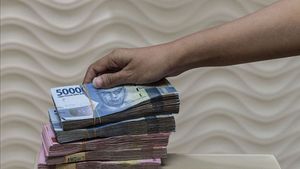YOGYAKARTA The issue related to the Indonesian government's foreign debt is always hotly discussed by the public.
One of the issues that are often discussed is how the Government pays off foreign debt (ULN).
In Government Regulation of the Republic of Indonesia Number 10 of 2011 concerning Procedures for Procurement of Foreign Loans and Grant Revenue, it is explained that foreign loans are financing obtained through debts obtained by the Government from Foreign Loaners.
The financing is tied up with a loan agreement and is not in the form of a state securities, which must be paid under certain conditions.
State loans appear for various reasons, one of which is because state spending and state revenues are not balanced. State spending swells while state revenues do not increase. To cover these needs, the Government decided to pay off.
In general, the Government's repayment of foreign loans or debts is carried out in various ways.
One of the ways the state pays foreign loans is to take advantage of the flexibility of debt instruments. This method is profitable because the costs are more efficient than foreign loans. In addition, the conversion of loans to loans has low costs and risks.
The government's way of paying foreign debt can also be done using a debt swap method, namely paying off loans by matching them into certain programs.
As mentioned earlier, the Government was forced to apply for foreign loans because state revenues were unable to meet the state budget (APBN). Meanwhile, the source of state budget revenue is tax.
Taxes have a big role to play in the interests of development and cover government spending, including related to foreign debt payments.
Government Securities (SBN) are securities issued by the Government of Indonesia. SBN is issued to finance the state budget. When someone buys SBN, it can be interpreted that the buyer lends money to the Government. As a return, SBN holders will benefit in the form of coupons (bond interest).
In general, the repayment of foreign debt can be taken from the exports of a country. This is also done by Zambia. The growth of Zambia's foreign debt had touched the figure of 10.5 billion US dollars in 2018. Then in 2019, Zambia adopted a policy of legalizing cannabis exports. Exports are said to be able to reduce state debt.
Unfortunately, the cannabis export policy cannot be legalized in Indonesia because the plant is included in the ban. However, Indonesia has other export sources whose results can be used to pay off foreign debts.
The amount of debt from the Indonesian government was reported by the Ministry of Finance. Until the end of December 2022, the Government's debt reached IDR 7,733.99 trillion with a debt ratio of 39.57 percent. In the 2022 KITA APBN book kaleidoscope, the nominal amount and the ratio of government debt increased when compared to the previous month, November 2022.
However, when compared to the same period in the previous year, in December 2021, the debt-to-GDP ratio actually decreased from the previous 40.74 percent to 39.57 percent. The Ministry of Finance said that fluctuations in the position of government debt were influenced by the existence of transactions in the form of issuance and repayment of SBN, withdrawal and repayment of loans, and changes in exchange rates.
That's information regarding the government's way of paying off foreign debt. Visit VOI.ID to get other interesting information.
The English, Chinese, Japanese, Arabic, and French versions are automatically generated by the AI. So there may still be inaccuracies in translating, please always see Indonesian as our main language. (system supported by DigitalSiber.id)













